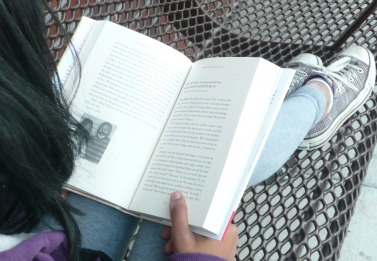 Why you should make reading a practice, not a project
Why you should make reading a practice, not a project
Reading is no longer a priority for America. Book lists become scratch paper, library accounts sit unused for weeks or even months. This neglect towards reading is slowly growing. And it starts early—with today’s teenagers.
Few teens nowadays make time to read. According a study done on reading by the National Endowment for the Arts, “Reading at Risk”:
- There has been a 14% decline in the number of thirteen-year-olds that are daily readers, decline from 20 years earlier. During the same period, the percentage of 17-year-olds that were non-readers doubled.
- Twelfth-graders’ reading scores fell significantly from 1992 to 2005
- Fifteen-year-olds in America ranked fifteenth in average reading scores out of 31 industrialized nations, falling behind Poland, France, Korea, and Canada, to name a few.
 In today’s society, people claim that they “just don’t have time.” But here are a few reasons why you should make time to read:
In today’s society, people claim that they “just don’t have time.” But here are a few reasons why you should make time to read:
5. Read for entertainment value. Invent a social networking site, an extensive video archive, and an almighty communication hub and suddenly reading is obsolete? There are certain insights that neither viral videos nor spamming can teach (no, chain emails are not informational). And is it not good enough that books can take you into an alternate universe, pull you out of your stressful life for a while, give you an entirely new viewpoint and make you smarter without you ever having to leave your chair? Thought so.
To avid reader sophomore Stephanie Chang, reading is a way to learn more about the world than what’s on the morning news. “[MVHS] is a closed place,” Chang said. “You don’t get to know anything out of this area, and reading takes you into other worlds and perspectives.” She reads one to two books on a busy week, and six to eight books on a relaxing one.
4. There is a certain value to setting aside time to read. Some are lazy. Some have assigned reading that takes priority over pleasure reading. But if you can read despite these challenges, you’re solid gold. People that read are a hot commodity—they have something more than the average intellectual. Plus, it’s pretty cool be able to sneak references to those books into everyday conversations. You’d probably be the only one with the foggiest notion as to what they meant.
Freshman Amy Tsai reads just about anything she can get her hands on, every single day. She says the trick is not to be picky. “You can read lots of articles online, and you can read textbooks when you have to study,” Tsai said. “Reading is reading.”
3. Reading is awesome with the folks. Your mom and dad might not be impressed by a lot, but one thing is certain: they will not be impressed by your high score on COD: Black Ops. Instead of keeping a running count of things that you have virtually exploded, keep a tally of books you have read—real books, not just graphic novels. Showing your parents this list is an excellent persuasive tactic when you need money, a ride someplace, or just some respect. Which, remember, will not be earned by blasting things on a screen.
2. If nothing else, do it for the SAT. When we cram lists of vocabulary up into our brains, they become facts, not words. Facts that you can’t put into context, understand, or use when you are required to know a synonym, or an alternate meaning. It may sound cheesy, but those that read, process, and contextualize those words from facts into a language are the ones that get the cheddar.
Junior Maya Lewis reads historical fiction, fantasy, nonfiction, and tons more. She says that this may be the reason she performs well in the literary sections of standardized tests.
“A lot of people read for the vocabulary,” Lewis said. “I scored much better on the Critical Reading section than I did on the others.”
You do the math.
1. It keeps the imagination alive. Okay, it might not actually die, but it will suffer a serious loss. When we read, our brain links images described in the story to places we have seen. Sometimes, we even come up with our own images. But when you watch a movie, especially the movie that is based off of a book you are reading, the images that you create are replaced by the carefully crafted, trademarked scenes from the movie. In general, watching movies and T.V. puts your brain on image overload, so eventually your brain stops making up images and begins to pull from those you see on the screen.
“‘The best books are not the ones the right kind of people read, but the books that make the right kind of people,’” Lewis said, quoting renowned author C.S.Lewis. She believes reading also makes us think and recognize more about the world around us. “[Reading] makes us human.”








